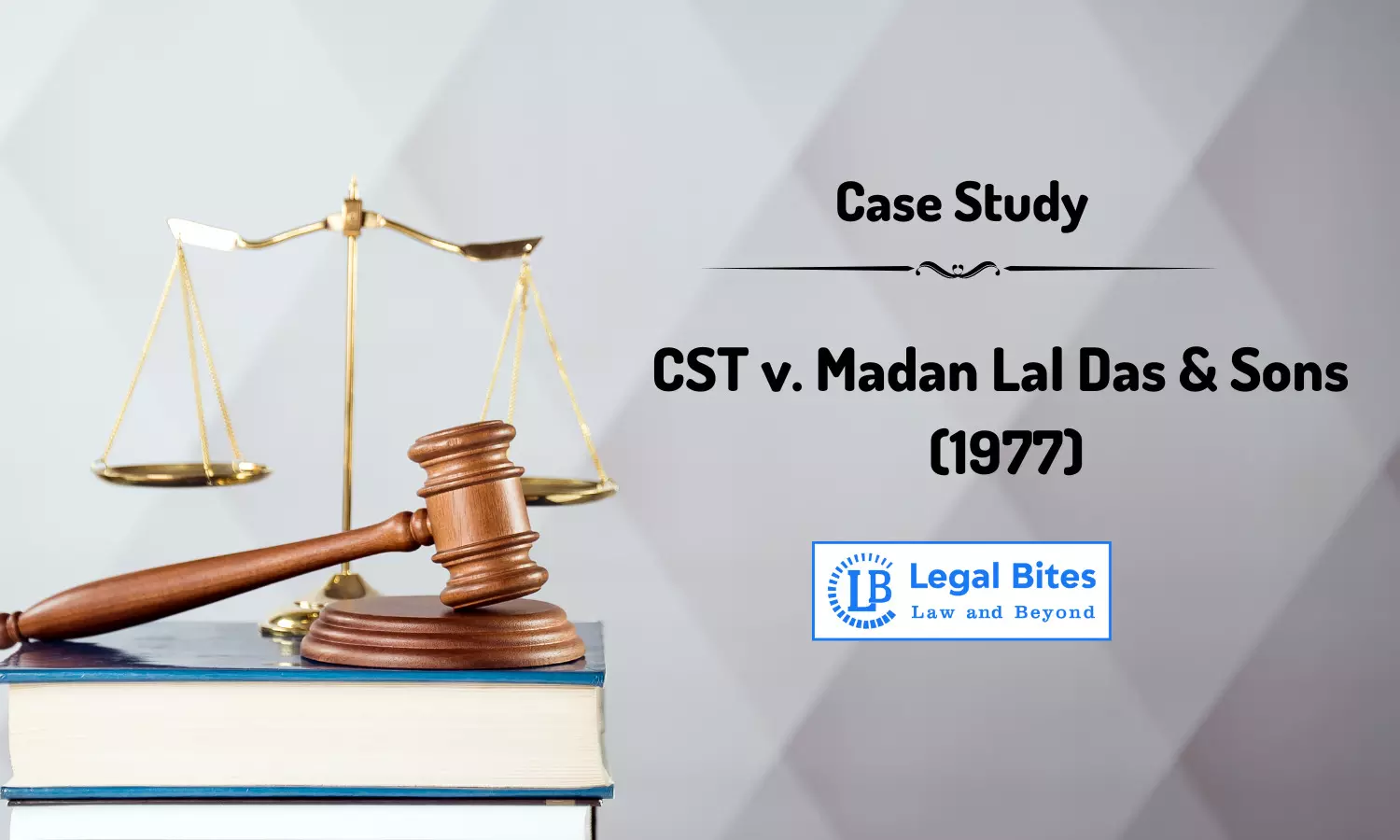Case Study: The Commissioner of Sales Tax, U.P. v. M/s. Madan Lal Das & Sons, Bareilly (1977) | Section 12 of the Limitation Act, 1963
The Case Study: CST v. Madan Lal Das & Sons (1977) is a classic case of the law of limitation relating to Section 12 of the Limitation Act, 1963.

The Case Study: CST v. Madan Lal Das & Sons (1977) is a classic case of the law of limitation relating to Section 12 of the Limitation Act, 1963 where the apex court dealt with the question of time taken to obtain a copy or decree from the court in regards to revision application.
Case Title: The Commissioner of Sales Tax, U.P. v. M/s Madan Lal Das & Sons, Bareilly
Court: Supreme Court of India
Citations: AIR 1977 SC 523
Judges: Justice H.R. Khanna, Justice N.L. Untwalia & Justice Jaswant Singh
Facts
- The respondent filed an appeal against the Sales Tax Officer’s order, which was disposed of by the Assistant Commissioner (Judicial) Sales Tax, Bareilly.
- The appellate copy was served to the respondent on August 2, 1965 which was lost so they applied for another copy on June 15, 1966 that was delivered to them on August 18, 1967.
- The respondent claimed entitlement to exclude the time spent in obtaining the copy while computing the limitation period under Section 12(2) of the Limitation Act, 1963 (hereinafter as “1963 Act”) for filing of revision.
- In the revision petition, the decision was in favour of the respondent.
- The Commissioner of Sales Tax, UP (hereinafter as “CST”), challenged this decision in the Allahabad High Court and contended that the time spent on obtaining the copy must not be excluded, however, their case did not stand.
- So, CST approached the Supreme Court against the decision of the High Court.
Issue
- Whether the duration spent in acquiring another copy of the appellate order be disregarded in calculating the limitation period for submitting a revision under Section 10(1) of the UP Sales Tax Act (hereinafter as “Tax Act”), considering that one copy of the appellate order was already delivered to the dealer as mandated by this Act?
Laws Applied
- Section 12(2) of the Limitation Act, 1963 which provides for exclusion of time in legal proceedings.
- Section 29(2) of the Limitation Act, 1963 which is the savings clause.
- Section 10(1) of U.P. Sales Tax Act, 1948
Arguments Before Court
- The appellant, CST, contended that the Tax Act is a complete code in itself which also stipulates the limitation period for filing of revision petition, so the High Court cannot rely on the provisions of the Limitation Act,1963.
- The respondent didn't need to submit a copy of the order of the Assistant Commissioner along with the revision petition and therefore, the time spent on obtaining the copy could not be excluded.
- It was also argued that the copy of the Assistant Commissioner’s order was already served to the respondent, making it unnecessary for the respondent to apply for a copy.
- The respondent argued that under Section 12(2) of the 1963 Act, he was entitled to have the time spent obtaining a copy of the appellate order excluded when determining the time limit for filing the revision.
Judgment
In this case, the court drew a slight comparison between the 1963 Act and the 1908 Act in light of Section 12(2). It was observed that the 1963 Act additionally deals with the exclusion of periods in case of applications for revision as well and that as the instant matter was governed by the 1963 Act, the said provision will apply to it. It also takes note of Section 29(2) of the 1963 Act and observes that nothing in the Tax Act expressly excludes the application of Section 12(2). Therefore, this provision of the 1963 Act can be relied upon in calculating the period of limitation as prescribed for filing a revision petition under Section 10 of the Tax Act.
The court held that it cannot be inferred from Section 12(2) that the time taken to obtain a copy of the decree or order thereof, whatever is applicable, can be excluded only if such copy is to be filed along with the revision application. The reasoning given by the court was that a party and their lawyer could not decide whether to file a revision application or not without a copy of the said decree or order. Also, as the respondent had lost his original copy of the order, he needed to apply for another copy of the said order.
Therefore, the court held the appeal to be within the time frame stipulated by the 1963 Act. It was observed that the term “time requisite” under Section 12(2) of the 1963 Act does not refer to the absolute minimum time needed to obtain a copy of the order. As per the court, the deductible time under the provision is not limited to the shortest possible duration for obtaining a copy of the order in question.
Therefore, in hindsight, the court rejected all the contentions raised by the appellant.
Important Links

